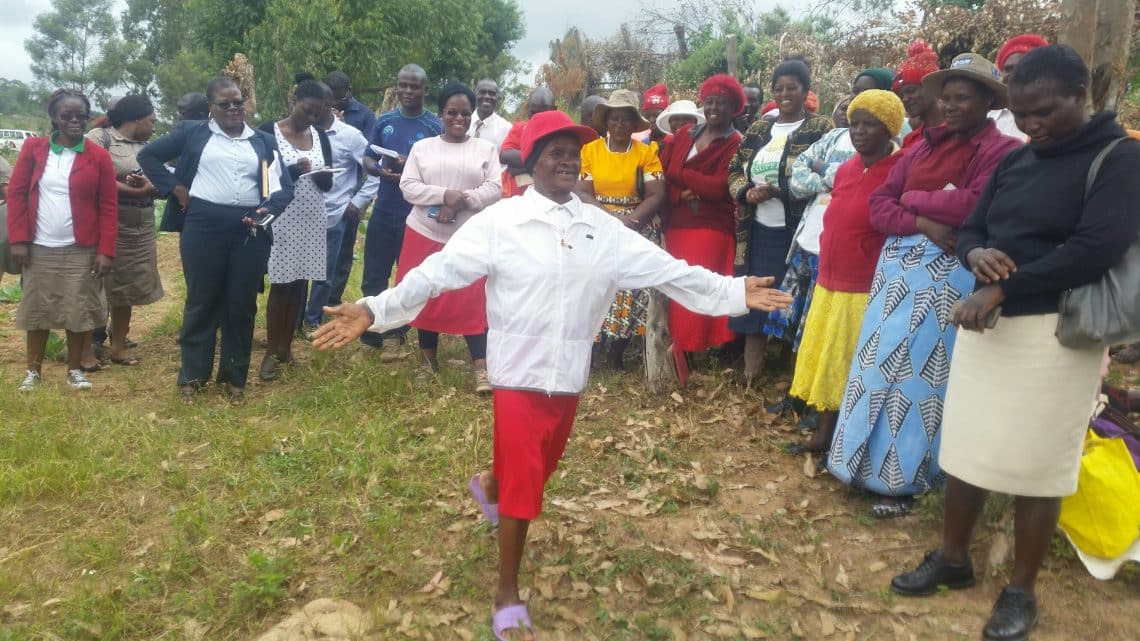By Byron Mutingwende
Judith Mafunga Chikono, a member of the Neverlate Horticulture group in Ward 18 of Mutasa District recounts how she has benefitted from the Improved Nutrition and Sustainable Production for Increased Resilience and Economic Growth (INSPIRE) project.
“Through INSPIRE, I received theoretical and practical training on good agricultural practices of horticultural crops and bio-fortified crops. I was also trained on keeping livestock. As we speak, I have won the first prize at the previous district agricultural show where I received a hoe, a ripper and some plates.
“At our farm with my husband, we have a banana plantation and I also have three dairy cows and some broilers. We also have a home nutrition garden where we grow a variety of crops,” Chikono said.
She made the remarks on 11 April 2018 during high-level United Nations (UN) Convergence tour of the Mutasa district. The tour aimed to create an opportunity to the visiting delegation of Senior Government Officials and UN Heads of Agencies to experience first-hand and better understand ongoing programmes in Mutasa district and areas of convergence, not only between the three agencies, but also with other relevant stakeholders in the district.
The UN Network comprising of the United Nations Children’s Fund (UNICEF), the Food and Agriculture Organisation (FAO) and the World Food Programme (WFP) has been implementing activities that seek to address the food and nutrition security challenges in Mutasa district.
Valeria Nyanzira a programme officer with the INSPIRE project said the Neverlate Group underwent training in group cohesion, farming as a business and post-harvesting handling techniques so as to complete the package of trainings for better quality of produce.
“We encouraged them to grow hybrid crop varieties. This motivated the group to mobilise funds to establish a demo plot comprising of diverse crops: 1 000 cabbage plants, 0, 04 ha of carrots, 0, 04ha of peas and 330 greenhouse tomato plants. The selection of crops for the demo plot was according to the requirements of the targeted markets and nutritional value of the crops,” Nyanzira said.
Elizabeth Nyahoda, born in 1931, who is a member of the Neverlate Horticulture group said she also replicated the nutritional garden at her homestead and went further to integrate fish farming at home. She has also gone on to establsish an orchard. Nyahoda said she sends her family members who live in Bulawayo some of the harvests from her farming enterprises since she is now able to produce enough for personal consumption and for sale.
Emma Nyadundu, the Secretary of Neverlate Horticulture Group said they managed to produce quality cabbages, carrots, peas and tomatoes, which attracted commercial buyers such as Choppies, OK and Brands Fresh in Mutare.
Vengai Taremba, the Mutasa District Nutritionist said Mutasa district falls into three main livelihood zones. These are the Eastern Highlands prime communal, the Eastern Highlands commercial farming and the Central and Northern Semi- intensive Farming (CNSI) zones.
“The main food crops produced in this distrct are bananas, maize, beans, cabbages, peas, cauliflower, green beans and green pepper. These are produced throughout the year for consumption and for sale. Crops that are produced on seasonal basis for household consumption and for sale are yams, sweet potatoes, cassava, potatoes, cow peas, avocados, oranges, naartjes, sugar cane and pine apple,” Taremba said.
In 2017, through the multi-sectoral collaboration, there was supervision of all the 31 Ward Food and Nutrition Security Committees (WFNSCs) established in the district. Mutasa also held an inter-district learning visit with Mwenezi where 248 members from WFNSCs were trained on community-based model on food and nutrition security.
They also conducted drivers of stunting assessment in 20 wards where they identified low exclusive breastfeeding rates, low dietary diversity and poor hygiene and sanitation practices.
“We realized the importance of involving all relevant stakeholders at all levels capacity building and team building and integrating FNS with other existing programs. It is equally important to engage local NGOs for support such as transport for monitoring visits and refreshments for coordination meetings.
We should ensure regular administration of vitamin A supplementation at community level through village health workers and the consumption of our own agricultural products and selling surpluses,” Taremba added.
Forbes Mutsvikiri, the Mutasa District Crop and Livestock Officer who is the Chairperson of the District Food and Nutrition Security Committee said all ward committees and traditional leadership had also undergone training so were aware of Food and Nutrition topical issues.
“There is evidenced teamwork in both District and Ward committees. The District Administrator also supports the committees in his capacity and most members support the committee through availing reports and cooperation,” Mutsvikiri said.
He bemoaned poor documentation in both the District and Ward committees mainly due to lack of resources and sometimes cooperation from some of the key members.
“Some members do not submit reports when requested. Due to the poor documentation the innovations carried out are not recorded giving a picture of zero innovation. Development partners have supported government efforts in terms of new technologies.”






